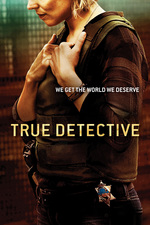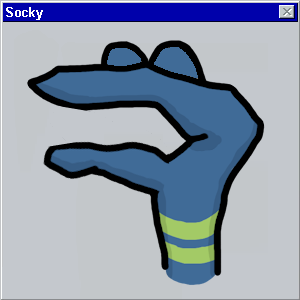True Detective: Form and Void Rewatch
November 4, 2014 11:48 AM - Season 1, Episode 8 - Subscribe
Case files... We're gonna hafta be lookin' at these records with fresh eyes, alright? Like we're totally green. Marty and Rust use every last resource to chase down Marty's hunch about the green-eared spaghetti monster. Green eyes, green ears, green paint, and then the Yellow King in Carcosa.
STOP IT OVER THERE at Darkness Becomes You! (Bonus Materials)
Glenn Fleshler portrays Errol 'Yellow King' Childress. Vulture interviews him about the peculiarities of portraying the scariest man on television, and GQ offers a short profile of the man himself.
There is zero non-scored music in this episode (past the opening titles), so instead of a Youtube playlist here's a link to gnuhavenpier's excellent MeFi post profiling The Handsome Family.
STOP IT OVER THERE at Darkness Becomes You! (Bonus Materials)
Glenn Fleshler portrays Errol 'Yellow King' Childress. Vulture interviews him about the peculiarities of portraying the scariest man on television, and GQ offers a short profile of the man himself.
There is zero non-scored music in this episode (past the opening titles), so instead of a Youtube playlist here's a link to gnuhavenpier's excellent MeFi post profiling The Handsome Family.
Annalee Newitz's recap of the finale still sums up my own feelings nicely.
posted by homunculus at 11:18 AM on November 15, 2014
posted by homunculus at 11:18 AM on November 15, 2014
The opening of this show is the only time we've spent focused on someone not Rust or Marty. And yet, since we understand that we're watching the man we've been chasing this entire time, he's as integral as the other two. This is something noted in the 'making-of' segment too.
The house is a disturbing relict, the assorted detritus of generations. Just like the killer.
What's interesting to me is how he puts on and takes off the voices, like wearing a suit. Glenn Fleshler, the actor, talked about Childress' backstory a little. It's .... not great.
The Creole Nature Trail is down deep in the Louisiana 'outback.' There's another aerial shot of a highway interchange. At this point it's deliberate, the shots again and again, the use in the opening credits. Looking at the highways, it's hard to see it as anything other than a scar across the land. The individual automobile, car-culture, is the ultimate symbol of atomization and familial collapse - the highway interchange with the super-dense spaghetti superstructure is the physical representation of the insanity of the world.
Rust, with that ledger: 'Did he pay his taxes?'
As a complete aside, 'aluminum and ash' is probably not a bad representation of what space smells like.
Carcosa appears to be an abandoned third-system fort. I can personally attest they can be scary as shit. I spent a Halloween in the third-system Fort Zachary Taylor, which was cleaned up and turned into a haunted house. The necessities of muzzleloaders and Dahlgren guns make for thick walls, low ceilings, and little light in the structure.
Not a place you wanted to be poking in shadows.
Rust enters the arena, topped by the oculus, or eye, and has a vision of his own. And Marty runs in with his weak-ass .38. You have terrible tactics, Marty.
I feel better about this ending than Annalee Newitz and homunculus. 'That ain't what kind of world it is.' A member of this site (whose comment I am not inspired to look up) tied Errol Childress to the idea that everything, even the level of evil from 'Carcosa,' (obviously used by the Tuttle patriarch and originator of the cult that gave him access to children) decays in the swamps of Louisiana.
Many people viewed Rust's optimism as a betrayal of his character, but I'm of the opinion his cynicism and pessimism were a wall, put up to protect himself after the death of his daughter. He's not a natural misanthrope - he has to be one, otherwise he'd have to face his daughter's death (and his involvement in it). After surviving something that, I think, he doesn't expect to survive, he has a reason to think there's a positive meaning to life.
posted by the man of twists and turns at 8:50 PM on November 23, 2014 [3 favorites]
The house is a disturbing relict, the assorted detritus of generations. Just like the killer.
What's interesting to me is how he puts on and takes off the voices, like wearing a suit. Glenn Fleshler, the actor, talked about Childress' backstory a little. It's .... not great.
The Creole Nature Trail is down deep in the Louisiana 'outback.' There's another aerial shot of a highway interchange. At this point it's deliberate, the shots again and again, the use in the opening credits. Looking at the highways, it's hard to see it as anything other than a scar across the land. The individual automobile, car-culture, is the ultimate symbol of atomization and familial collapse - the highway interchange with the super-dense spaghetti superstructure is the physical representation of the insanity of the world.
Rust, with that ledger: 'Did he pay his taxes?'
As a complete aside, 'aluminum and ash' is probably not a bad representation of what space smells like.
Carcosa appears to be an abandoned third-system fort. I can personally attest they can be scary as shit. I spent a Halloween in the third-system Fort Zachary Taylor, which was cleaned up and turned into a haunted house. The necessities of muzzleloaders and Dahlgren guns make for thick walls, low ceilings, and little light in the structure.
Not a place you wanted to be poking in shadows.
Rust enters the arena, topped by the oculus, or eye, and has a vision of his own. And Marty runs in with his weak-ass .38. You have terrible tactics, Marty.
I feel better about this ending than Annalee Newitz and homunculus. 'That ain't what kind of world it is.' A member of this site (whose comment I am not inspired to look up) tied Errol Childress to the idea that everything, even the level of evil from 'Carcosa,' (obviously used by the Tuttle patriarch and originator of the cult that gave him access to children) decays in the swamps of Louisiana.
Many people viewed Rust's optimism as a betrayal of his character, but I'm of the opinion his cynicism and pessimism were a wall, put up to protect himself after the death of his daughter. He's not a natural misanthrope - he has to be one, otherwise he'd have to face his daughter's death (and his involvement in it). After surviving something that, I think, he doesn't expect to survive, he has a reason to think there's a positive meaning to life.
posted by the man of twists and turns at 8:50 PM on November 23, 2014 [3 favorites]
The year in TV: How the shows of 2014 remade “masculinity” on television
From "True Detective" to "Looking" to "Mad Men," TV took the trope of the antihero and picked it apart
posted by the man of twists and turns at 11:11 PM on December 16, 2014 [1 favorite]
From "True Detective" to "Looking" to "Mad Men," TV took the trope of the antihero and picked it apart
posted by the man of twists and turns at 11:11 PM on December 16, 2014 [1 favorite]
the man of twists and turns: A member of this site (whose comment I am not inspired to look up) tied Errol Childress to the idea that everything, even the level of evil from 'Carcosa,' (obviously used by the Tuttle patriarch and originator of the cult that gave him access to children) decays in the swamps of Louisiana.
That was me, responding to deanc's comment.
Sorry for the super-late comment, but I just finished rewatching the series. This was my initial take on the season's theme; I'm still thinking along those lines. I'm still not getting the disappointment with the ending.
posted by spaltavian at 7:07 AM on March 18, 2015
That was me, responding to deanc's comment.
Sorry for the super-late comment, but I just finished rewatching the series. This was my initial take on the season's theme; I'm still thinking along those lines. I'm still not getting the disappointment with the ending.
posted by spaltavian at 7:07 AM on March 18, 2015
Upon rewatch, it's hard not to see a parallelism between the stone 'gurney' in Carcosa/ Fort Macomb-- where men do terrible things to young women with knives-- and Hart's hospital bed at the climax of the show-- where he's surrounded by the women who heal him despite all his wrongs.
posted by eustatic at 1:19 AM on May 4, 2016
posted by eustatic at 1:19 AM on May 4, 2016
Rust, with that ledger: 'Did he pay his taxes?'
In the scene directly before that,
Marty, subject to another Rust philosophical drop: 'What's scented meat?'
posted by carsonb at 8:36 AM on February 4, 2019 [2 favorites]
In the scene directly before that,
Marty, subject to another Rust philosophical drop: 'What's scented meat?'
posted by carsonb at 8:36 AM on February 4, 2019 [2 favorites]
You are not logged in, either login or create an account to post comments



I was so, so thrilled when it didn't end like I expected it to with Rust and/or Marty dead. Because here's what I expected: Rust dies in Carcosa, probably after saying something meaningful and/or fucked up to Marty. Marty kills Childress and makes it out, tells the whole story to Papania and Gilbough, and then proceeds to drink and whore himself to death. Moral of the story: the corruption of Carcosa and the evil that men do contaminate everything and there is no escaping them.
But we didn't get that! And I'm still so, so happy about it! It's not even that what we got was a happy ending, because it wasn't really an unqualified happy ending. It was more that it was an ending that felt earned, and that felt like it meant something. I maintain that the "rocks fall everyone dies," ending that so many people seem to have expected and wanted wouldn't really have meant anything, because it wouldn't have told us anything new or interesting about the characters or the story. Also, I frankly think the grim, unhappy or ambiguous ending is the easy way out for this sort of show. With True Detective, I think it would have essentially maintained the status quo and flattened the arc of the whole series. So even months and a couple of rewatches later, I stand by one of my initial comments after I watched the finale for the first time.
posted by yasaman at 7:31 PM on November 5, 2014 [7 favorites]